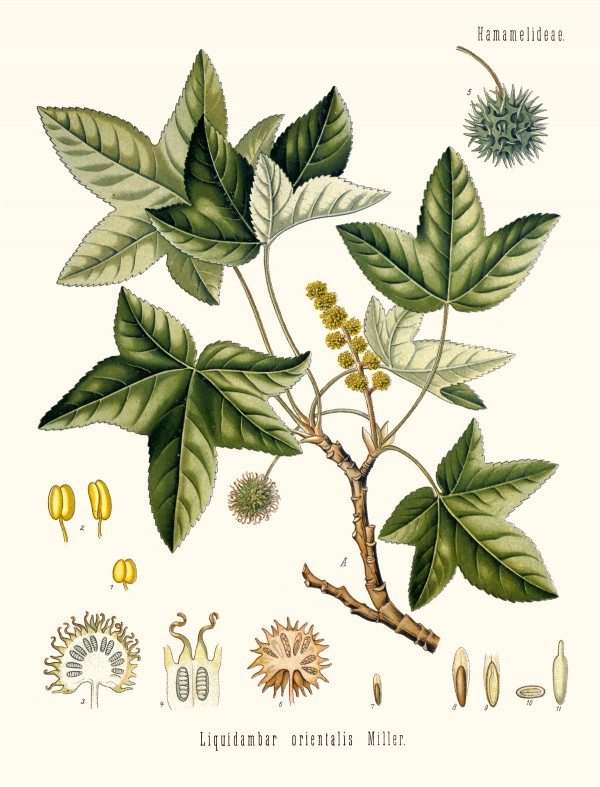Dies ist eine alte Version des Dokuments!
Liquidambar orientalis Mill. - Hamamelidaceae - Oriental sweet-gum, Levant storax, Orientalischer Amberbaum
Deciduous tree, up to 15m high, native to the eastern Mediterranean region.
„The name in Turkish for the particular species is Günlük ağacı, while the trees of the genus as a whole are called Sığala ağacı, a name also used in sole reference to oriental sweeetgum itself. Günlük ağacı means “a frankincense/myrrh tree [ağaç]” in which the first element is of unknown origin, whereas sığala refers to “a boggy place”… The extraction of its sap and the production of an oil based thereof (sığala yağı), as well as exports of these products, play an important role in the local economy… The stripped sap is put in boiling water to soften, then pressed. The styrax is then diluted with ¼ water, keeping it soft and preserving its aroma. By steam destillation a light yellow oil is obtained, which can be used for medical applications.“ http://en.wikipedia.org/wiki/Liquidambar_orientalis
„Threats to extinction: The forests of L. orientalis have been severely destroyed during the last 200 years. This disappearance has started the chain of events leading to an extinction of many other species. Unfortunately, the landscape is becoming increasingly fragmented leading towards a loss of too many species, which means a psychological and spiritual loss too… The area of this taxon has got reduced from 7000 to 1657.80 ha during the last 200 years. Major anthropogenic impacts involved in the decline of this important genetic heritage are habitat destruction due to cutting and felling for wood, followed by a change of the land use, grazing, resin extraction and urban development pressures.“ http://isebindia.com/01_04/04-10-3.html
Main components of a commercial sample of the essential oil from L.orientalis were (E)-cinnamyl alcohol (45%) and hydrocinnamyl alcohol (41%). Minor constituents are β-caryophyllene (3%), styrene (1.5%), benzyl alcohol (1.2%), α-pinene (1%) and benzaldehyde (0.4%).
[Nematicidal activity of plant essential oils and components from coriander (Coriandrum sativum), oriental sweetgum (Liquidambar orientalis), and valerian (Valeriana wallichii) essential oils against pine wood nematode (Bursaphelenchus xylophilus). Kim, J., Seo, S. M., Lee, S. G., Shin, S. C., Park, I. K., Journal of agricultural and food chemistry, Vol.56(16), 2008, 7316-7320]

Köhler,F.E., Medizinal Pflanzen, vol.2 t.101 (1890)
http://plantgenera.org/species.php?id_species=611243




